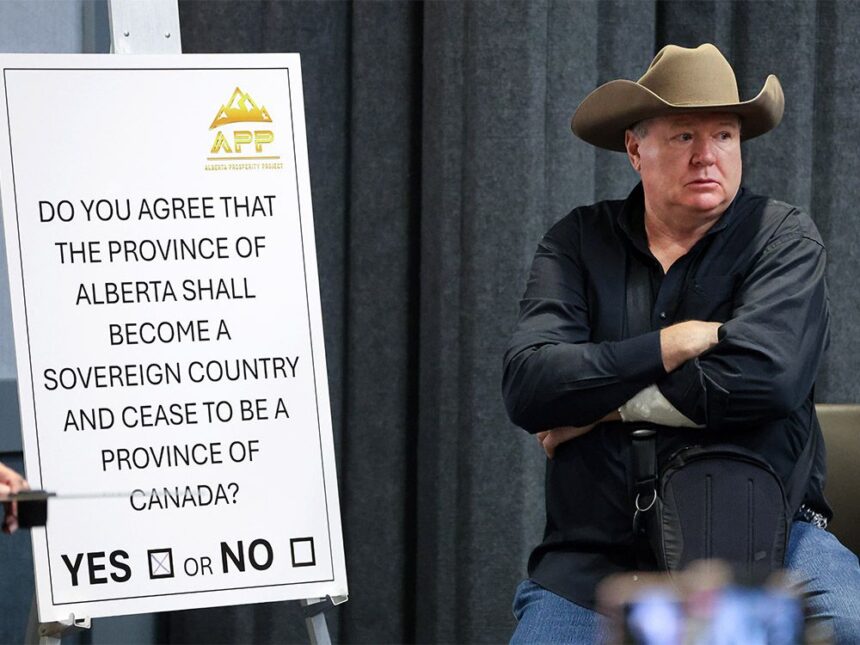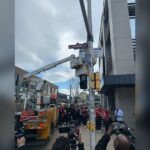I’ve been tracking Alberta’s separatist movements for years, but even I was surprised by yesterday’s announcement. The Alberta Independence Party revealed ambitious plans for a provincial independence referendum next year, escalating separatist rhetoric that’s been simmering since the 2019 federal election.
The group’s president, Michelle Cooper, unveiled their strategy at a packed town hall in Red Deer, where roughly 300 supporters gathered. “Albertans deserve the right to determine their own future,” Cooper told the crowd. “We’ve contributed billions to confederation while receiving disrespect and obstruction in return.”
Their proposed referendum question asks: “Should Alberta become an independent nation separate from Canada?” The group claims to have gathered nearly 35,000 signatures supporting the initiative—impressive, though still far short of legal requirements to force a provincial vote.
What’s driving this renewed push? Cooper points to familiar grievances: federal carbon tax policies, pipeline obstructions, and perceived inequities in federal transfer payments. The timing isn’t accidental either, with Alberta’s economic recovery showing promise amid volatile energy prices.
Political science professor Dr. Roger Gibbins from the University of Calgary told me these movements typically gain momentum during economic downturns and federal-provincial tensions. “While separatist sentiment rarely exceeds 25% support in Alberta polls, it serves as a powerful negotiating tool for provincial governments seeking better terms within confederation,” Gibbins explained.
Premier Danielle Smith’s office responded cautiously, acknowledging Albertans’ frustrations while reaffirming commitment to seeking “a fair deal within Canada.” Smith has previously supported Alberta autonomy measures without explicitly endorsing separation.
This isn’t Alberta’s first flirtation with separatism. The movement peaked in the 1980s during Pierre Trudeau’s National Energy Program before resurging after Justin Trudeau’s 2019 re-election. According to an Angus Reid poll from January, approximately 20% of Albertans would support independence—significant but not majority sentiment.
Longtime political observer Janet Brown notes these cycles reflect deeper tensions. “When Albertans feel their economic contributions aren’t respected, separatist sentiment becomes a pressure valve,” she said during our phone conversation yesterday.
I’ve covered numerous sovereignty movements during my time reporting in Calgary, and each shares common elements: economic grievances, cultural divergence, and frustration with eastern Canadian political dominance. What makes this effort different is its sophisticated digital organization and funding structure.
The economic realities of separation remain complex. Alberta would face challenges establishing currency, trade agreements, and possibly landlocked status—issues the independence group acknowledges while arguing these barriers aren’t insurmountable.
At the Red Deer meeting, I noticed significant diversity among attendees—energy workers, small business owners, and increasingly, younger professionals frustrated with federal climate policies they view as existentially threatening to Alberta’s economy.
Whether this momentum translates to electoral success remains questionable. The Alberta Independence Party failed to win seats in previous provincial elections, and organized separatist movements have historically struggled to maintain cohesion.
Legal experts point out that any separation would require constitutional amendments and federal cooperation—an extraordinarily high bar. University of Alberta constitutional scholar Patricia Hughes explained, “The Supreme Court’s Quebec secession reference established that while provinces can hold referendums, they cannot unilaterally separate.”
For average Calgarians I spoke with downtown this morning, reactions were mixed. “I understand the frustration, but separation seems extreme,” said James Kendrick, an oil and gas accountant. Meanwhile, small business owner Sarah McLeod expressed more sympathy: “Maybe this will finally make Ottawa take our concerns seriously.”
As Alberta navigates post-pandemic recovery and energy transition challenges, the separatist movement serves as both political barometer and pressure tactic. Whether it evolves beyond that into a serious constitutional challenge depends largely on federal-provincial relations in the coming months.
I’ll be following this story as it develops, particularly watching how mainstream provincial politicians respond to this pressure from their right flank.







